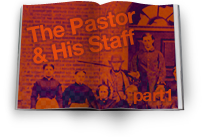Book Review: The Pastor as Scholar and The Scholar as Pastor, by John Piper and D. A. Carson
I have to admit that when I first saw this book I smiled. I was reminded of something a fellow elder pointed out to me a dozen or so years ago. He was reading D. A. Carson’s Exegetical Fallacies and came across a remark to the effect that, “This is not only a mistake pastors make; it is a mistake scholars make also.” My fellow elder was laughingly and not so gently putting me in my place—one can be a pastor or a scholar, but not both! This book, however, as the title implies, is a call for pastors to be scholars and for scholars to fulfill the pastoral dimensions of their calling.
Of course, there is a sense in which Carson’s dichotomy must be allowed. Few pastors indeed will ever be able to keep up with all the current literature in various fields—something that is essential to the classroom. But the point of this little volume is to see the gap narrowed in meaningful ways. And to challenge us in this regard we could scarcely find more appropriate men than John Piper and Don Carson.
And “challenge” is the right word. It would be much easier for the scholar to neglect the “practical” dimension of the theological enterprise and for the busy pastor, caught up in the daily grind of people-work, to coast along producing sermons and Bible studies that allow him to get by. But the Christian ministry in both of these domains demands better.
In his “The Religious Life of Theological Students” Warfield addresses the all-too-common sentiment that “ten minutes on your knees will give you a truer, deeper, more operative knowledge of God than ten hours over your books.” He famously responds, “What! Than ten hours over your books on your knees?” His point was that learning is not opposed to godliness but complementary to it. Here Piper and Carson similarly remind us that learning (scholarship) and ministry are likewise complementary—the one is necessary to the other.
PIPER: RIGHT THINKING IS ESSENTIAL FOR TREASURING GOD
Piper spends more than half his essay reviewing his own life experiences that brought him to ministry and that shaped his own practice and goals in ministry. It is enjoyable reading, and those who have read Piper will find much familiar ground. Something of a “romantic rationalist,” he expresses his drive to think and understand things accurately and to experience life fully. This sets him up well for the point he wishes to stress: that we must bring together the notions of thinking and feeling. We are meant to enjoy God. This emphasis is familiar to all who have read Piper: “God is most glorified in us when we are most satisfied in him.” But his emphasis here is more specific: we will not enjoy God deeply or treasure him adequately until we understand him more accurately and more fully. And we will not understand him accurately or adequately until we learn to think well and deeply. “Christ exalting joy depends on right thinking about God” (50). Our learning—scholarship applied to the study of God—is necessary to a deep enjoyment and worship of him.
Piper deplores not only “ministry” which lacks doctrine. He deplores also ministry which can present high and wonderful truths about God in a way that miss the affections. “Too academic” is is not a problem. Merely academic is a problem. It ought to be the pastor’s goal, he says following Edwards, not just to heighten the affections of his hearers, but to raise their affections as far as possible by means of truth rightly understood. And this will not come except through hours of meditative, increasingly learned reflection on the Scriptures.
It is incumbent on all Christians and pastors in particular to learn and think well in order to experience and glorify God rightly. Piper does not set himself up as the model here, but he does express the passions of his own heart that have shaped his view of ministry.
Piper’s challenge is needed. This is something which all of us in pastoral ministry would do well to heed in order to fulfill our ministry.
Piper then provides several pages of clear and vivid exegetical grounding for his thesis. Space does not permit even a listing of his arguments here, so I will just note that his biblical analysis and application is compelling and is “must reading” for pastors. It will certainly prove helpful in shaping our own view of ministry.
In brief, Piper reminds us that God has revealed himself in a book. To know and understand God, then, we must ever give ourselves to a deeper and increasingly more accurate understanding of that book. And we must do that in order to convey the same to those who hear us.
CARSON: SCHOLARS MUST BE MORE THAN MERE ACADEMICS
Carson’s essay is directed to the professional scholar. He provides five introductory points that bring the discussion into focus. He wisely notes that God gifts his children sovereignly and in varying ways, and that no single mold should be considered standard. But he also notes that Christian responsibility remains, whatever the scholar’s particular areas of giftedness. The scholar’s subject matter demands more than merely academic attention.
Of foundational significance in this section is his brief but insightful exposition of the great commandment. The responsibility to love God with our entire being, including our “mind,” calls us to diligence in academic work, to be sure, but it requires much more. To heed this command the scholar cannot content himself with being merely an academic.
The burden of Carson’s essay is developed in a series of twelve exhortations. Space here allows mention of only a few. The professional scholar must involve himself in the church, in evangelism, and in front-line ministry of various kinds outside the classroom. He must not be a quartermaster only. Not only is this the responsibility of all Christians, but in doing so the scholar will improve his classroom effectiveness also. “Unless you are actively involved in pastoral ministry in some sense or other, you will become distant from the frontlines and therefore far less useful than you might be” (84).
Moreover, the scholar must recall at all times that however specialized his work, it is after all the Word of God that he studies, and he must never assume a position of superiority. “The aim is never to become a master of the Word, but to be mastered by it” (91). And whatever the particular area of specialization, the gospel must never become peripheral.
In terms of the scholar’s own role as teacher, “a scholar with pastoral concerns will be more than a dispenser of information” (94). He works with and serves men and women made in God’s image, and men and women for whom Christ died. And to be faithful he must shape his work accordingly.
Throughout this section Carson’s exhortations are pastorally wise and sensitive, and if heeded will only enhance the scholar’s effectiveness in service to the glory of God.
Carson writes to a narrower audience than Piper, but his essay is a delightful read throughout. The counsel of both men is marked by mature Christian wisdom and will be valuable reading for pastor and scholar alike.









